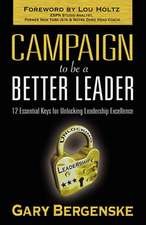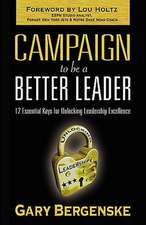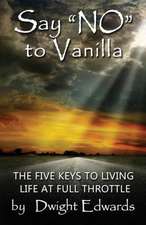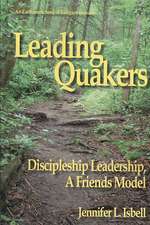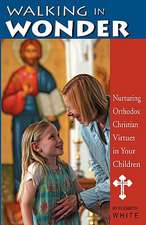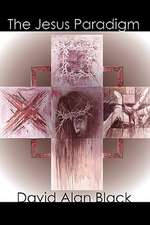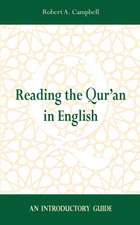Releasing the Rivers Within
Autor Mickey Edwards, Dwight Edwards Max Lucadoen Limba Engleză Paperback – 30 sep 2003
You want to influence others for God. To experience more of the abundant power Jesus promised. To live a life overflowing with God’s presence. To make a difference in the world.
So why do these desires go unfulfilled? Where can you find the resources you need to experience the exhilaration of utter dependence on God?
In Releasing the Rivers Within, Dwight Edwards reveals that all the good God wants to dispense through your life finds its origin in the indwelling supernatural resources He has already implanted within you.
As Jesus told us in John 7:38, every believer has “rivers of living waters” within, pressing forward and awaiting release. And as you open yourself up and allow God’s life to flow through you, you’ll bring the greatest glory to Him, the most good to others, and the deepest satisfaction to yourself.
Discover the resources God has placed within you. Release the rivers within…and experience life as God intended it: filled to overflowing.
Preț: 91.78 lei
Nou
Puncte Express: 138
Preț estimativ în valută:
17.57€ • 19.09$ • 14.77£
17.57€ • 19.09$ • 14.77£
Carte disponibilă
Livrare economică 01-15 aprilie
Preluare comenzi: 021 569.72.76
Specificații
ISBN-13: 9781578564606
ISBN-10: 1578564603
Pagini: 208
Dimensiuni: 140 x 216 x 18 mm
Greutate: 0.3 kg
Editura: Waterbrook Press
ISBN-10: 1578564603
Pagini: 208
Dimensiuni: 140 x 216 x 18 mm
Greutate: 0.3 kg
Editura: Waterbrook Press
Notă biografică
Dwight Edwards serves as senior pastor for the 2,500-person congregation of Grace Bible Church in College Station, Texas. A direct descendant of the renowned early-American preacher Jonathan Edwards, he attended Dallas Theological Seminary. He serves as a consultant to Dr. Larry Crabb's New Way Ministries. Dwight and his wife, Sandy, have three sons.
Extras
Introduction
Made for the White Water
Ablistering summer sun in the Texas Hill Country made it a great afternoon to be in the cool waters of the Guadalupe River. We had joined several other families in tubing down the river, laughing and splashing one another’s rafts as we lazily floated along.
Most of the time we drifted slowly down the waterway. But a few times when the river picked up speed, we found ourselves swiftly carried along in white water—a blessed relief from the snail-like pace we’d been keeping.
I noticed an interesting thing that afternoon. At certain portions of the river, people would get out, carry their rafts along the bank upstream, then get in to ride down these stretches again. Guess which places these were? You got it. The white water. Nobody wanted more of the slow drifting.
But several of us, myself included, went back to reexperience the brief rush of losing control and being swept along in the fastest currents. Slowmoving waters offered plenty of relaxed comfort, but excitement and adventure came only where the water was white.
And so it is with life. Especially our Christian lives.
Something within all of us militates against unrelieved sameness, even when it involves our own personal comfort, safety, and security. The depths of our beings cry out (if we’ll listen closely) for a cause greater than ourselves, a launching out into uncharted waters, an unbridled assault upon life. We were made to soar, and our hearts can never know the thrill of this God-ordained flight while our wings are clipped, even though what’s clipping them may be pleasant and comfortable.
Something within us recoils at John Stott’s description of those whose motto is “safety first” and who “are looking for a safe job in which they can feather their nest, secure their future, insure their lives, reduce all risks, and retire on a fat pension…until life becomes soft and padded and all adventure is gone.”1
“Human nature, if it is healthy, demands excitement,” wrote Oswald Chambers. “God never made bloodless stoics; He makes passionate saints.”2
Perhaps this is one reason for the popularity of fast-paced, actionpacked movies. Film critic George Grella attributes the success of James Bond movies to the fact that Bond “lives the dreams of countless drab people.”3 How sad that we so often try to quiet our hearts’ cry for adventure and excitement by experiencing it vicariously through others’ risktaking—especially when God has provided for this need in spades.
You and I were made for the white water. Within every believer, without exception, divine waters eagerly press forward to be released into the lives of others as well as into a desperately needy world. The releasing of these waters will be the riskiest and most exciting thing you’ll ever do with your life. It’s the key to white-water living for every child of God.
Christ has created and redeemed each of us to be His unique and personal waterway, through whom He can cause His living waters to spill forth for the glory of God, the good of others, and the damage of Satan.
Apart from Him we’re only bone-dry riverbeds, having nothing of eternal consequence to offer anyone. Yet through Him—ah, what a difference that makes!—every life has monumental potential for dispensing the living waters of God to the parched souls of men. And as His waters are dynamically released from within, we experience the exhilaration of utter dependence on God and His strong flow through our lives.
Vibrant Rest
That’s what this book is all about—an approach to life and ministry that absolutely requires God and says that without Him we don’t even need to bother showing up. It’s about leaving behind safe, predictable, boring spirituality for the ride of your life. It’s a humble attempt to expound the essentials of what I believe Paul meant when he wrote about our serving God “in the newness of the Spirit and not in the oldness of the letter” (Romans 7:6).
This book is about the high adventure of living under the spell and sway of what the Bible calls “the new covenant” (2 Corinthians 3:6). It’s about seeking to understand the reasons behind the glad shout that the whole of our existence begins and ends with God, for when the Christian life is properly lived, all the glory must go to God because all the good comes from God.
In the following chapters we’ll examine what this God-infused good is and how it can be released through us for the benefit of others and, most of all, for the glory of God.
It’s the vibrant rest of true spirituality.
What do I mean by vibrant rest?
It’s another way of expressing what Jesus had in mind: “Come to Me, all you who labor and are heavy laden, and I will give you rest. Take My yoke upon you and learn from Me, for I am gentle and lowly in heart, and you will find rest for your souls. For My yoke is easy and My burden is light” (Matthew 11:28-30).
If you reflect deeply on those words, you can’t help being impressed by the offer Jesus makes: Rest from the weight of sin, rest from the burden of guilt, rest from the tyranny of pressured obedience, rest from enslavement to men’s approval, rest from trying to measure up to God’s perfect standard—all are included here.
This wondrous rest of soul is in no way anemic, sluggish, or uninvolved. In fact, it’s just the opposite. It’s experienced only as we live in the exhilarating bondage of being inseparably yoked to the risen Christ. It means quietly and confidently abandoning ourselves to the control of God’s white-water currents as they carry us forward in the direction He’s heading.
Accompanying this flow is a God-energized, Christ-impassioned, spiritually vibrant rest that’s intensely active, yet never pressured, frantic, or guilt driven. It’s what I believe Jesus meant in John 15 by the word abide. It’s what Francis Schaeffer aptly described as “active passivity.”
Our vibrant rest is the glorious by-product of allowing God’s “rivers of living water” to flow out of our innermost being (see John 7:37-39). In the words of Dr. Larry Crabb, it means “releasing what is good”—and the “good” he speaks of is the life of Christ in our souls. As we abide in Him and allow His life to break forth through ours, we experience an energetic peace that defies description but not experience.
In my book Revolution Within, I focused on what it means to have rivers of living water dwelling within us. In this book I want to deal with what it means to have these rivers flow out through us into this broken, sin-sick world. I want to help you see what it looks like to have the life of God within us transported to the believers and unbelievers around us.
Radical, Naked Dependence
Why is this so important? Why bother to put out another book on Christian living and ministry when so many helpful ones are on the market already?
I find myself compelled to write because of two central truths I want to emphasize. You’ll find these same truths in other books, but candidly, such books are too few and were mainly written for previous generations.
My prayer is that the Spirit of God will be pleased to use this work to reawaken believers to these two core realities.
One of those realities is this: The kind of Christian living and ministry that exerts greatest influence for God is always based upon a Who rather than a what. The list of things promised in our day as keys to godly living and effective ministry keeps growing—spiritual disciplines, biblical knowledge, being personally discipled, fasting, ministry involvement, significant fellowship, power encounters, personal accountability, leadership principles.
All these are only “whats”—and while they have their place, they’re ineffective on their own.
This is why, after Paul’s confession of his wretchedness in battling sin in Romans 7, his subsequent question is so important: “Who will deliver me from this body of death?” (Romans 7:24). He doesn’t ask what will deliver him but Who. A what can never deliver us from sin; only a Who can do that.
Only a Who can flow through us to bring forth eternally significant ministry, as Paul knew: “I will not venture to speak of anything except what Christ has accomplished through me…by what I have said and done” (Romans 15:18, NIV). Paul saw the entire success of his ministry as a result of one factor alone: Christ, Christ, Christ! Jesus wore Paul as His personal suit of clothes; through Paul’s yielded body, Jesus could walk, talk, and—most of all—love.
Paul knew what it was to live in the white water of Christ’s life rushing though him. This can be our experience, too. It is, in fact, our sole hope for having genuinely supernatural and lasting impact on others: Christ within us being allowed to relive His life through us.
Reading those words, you probably agree with me already. Yet how easy it is for us to subtly move away from radical, naked dependence upon our indwelling Who and instead to depend, at least in part, on the many good whats available to us.
Clearly there’s a place in our lives for the whats. How then do we properly utilize them without depending upon them? What does it look like for our life and ministry to be carried out in such a way that the scorch marks of the supernatural are unmistakably visible? These are some of the questions we’ll explore throughout this book.
A Startling Outbreak of God
Here’s the second core reality I want to emphasize: Handiwork worthy of the name of God can be produced only by God.
We exist on this planet for one central, overriding purpose—God’s glory. What is His glory? Although there’s no way through the frail medium of human language to adequately describe or define it, I like to think of God’s glory as His stunning, surprising spectacularness. It’s His incessant off-the-chartness. On a scale of one to ten, every one of His attributes is a twenty and beyond.
God’s glory isn’t surprising to Him in the least, but to us it radiates a grandeur and splendor that rivets our attention, ravishes our affections, and draws us into a wide-eyed, breathless wonder experienced nowhere else.
What then does it mean to glorify God?
It means to be supremely satisfied in Him over all competitors. It means living a life that flaunts His excellencies before a watching world.
And it means our lives will pack an element of supernatural surprise. God can’t be glorified in lives that fail to go beyond what religious flesh can pull off on its own. Our existence must demonstrate more than predictable morality and run-of-the-mill kindness; our lives must disclose a visible, startling outbreak of God, a breathtaking display of divine artisanship.
Think of the Christians in the church’s earliest centuries. While far from being perfect, they nonetheless rocked the Roman world back on its heels with the gospel of Christ. No generation of believers since has had as great an influence for Christ in a shorter amount of time than those early saints. What was their secret?
Several things led to the incredible impact of the first Christians. One was their bold proclamation of the Word. Another was their unshakable belief that Jesus alone was Lord. And according to the observations of pagan governors and philosophers of the time, three qualities in particular caught the attention of those around them:
These believers had a joy that couldn’t be explained. Unbelievers recognized in them a deep and abiding sense of something even greater than happiness. It was a radiant joy that made no sense, given their difficult circumstances.
They also displayed a peace that couldn’t be sabotaged. Routinely, these Christians would submit to cruel death with a calm serenity that defied understanding.
Above all, they demonstrated a love that couldn’t be imitated. Their love for one another left observers scratching their heads.
How badly we need these same three qualities in our day! What will impact our world most powerfully is not telling people how wrong they are, but once again exposing them to a joy that can’t be explained, a peace that can’t be sabotaged, and a love that can’t be imitated.
God Does the Flaunting
But there’s a major problem with all this. We can’t do it! It’s like asking a one-year-old to play Mozart or a physically handicapped person to run in the Olympics. This degree of love and joy and peace is too far beyond our natural ability; if that’s what it takes to glorify God, we may as well close up shop and go home.
Fortunately, God has the answer to our dilemma.
You may have noticed that each of these three—love, joy, peace—are included in “the fruit of the Spirit” (Galatians 5:22-23). These are characteristics God’s Spirit produces, not what we produce ourselves. We can’t flaunt the excellencies of God before a watching world unless God does the flaunting!
This is why Paul prayed that we might be “filled with the fruits of righteousness which are by Jesus Christ, to the glory and praise of God” (Philippians 1:11). In large measure, that verse is what this book is all about—bringing forth Christ-produced fruit so we can live a Godspotlighted life. It’s about how to become a river of God, so the currents of Christ’s indwelling life can flow through us mightily and surprisingly, to the glory of the Father and the good of others.
The result? A white-water life coupled with a vibrant rest.
Come, my friend; let me invite you to come along on the same journey that I, very imperfectly, am taking myself.
Trust me—it will be the ride of your life.
Made for the White Water
Ablistering summer sun in the Texas Hill Country made it a great afternoon to be in the cool waters of the Guadalupe River. We had joined several other families in tubing down the river, laughing and splashing one another’s rafts as we lazily floated along.
Most of the time we drifted slowly down the waterway. But a few times when the river picked up speed, we found ourselves swiftly carried along in white water—a blessed relief from the snail-like pace we’d been keeping.
I noticed an interesting thing that afternoon. At certain portions of the river, people would get out, carry their rafts along the bank upstream, then get in to ride down these stretches again. Guess which places these were? You got it. The white water. Nobody wanted more of the slow drifting.
But several of us, myself included, went back to reexperience the brief rush of losing control and being swept along in the fastest currents. Slowmoving waters offered plenty of relaxed comfort, but excitement and adventure came only where the water was white.
And so it is with life. Especially our Christian lives.
Something within all of us militates against unrelieved sameness, even when it involves our own personal comfort, safety, and security. The depths of our beings cry out (if we’ll listen closely) for a cause greater than ourselves, a launching out into uncharted waters, an unbridled assault upon life. We were made to soar, and our hearts can never know the thrill of this God-ordained flight while our wings are clipped, even though what’s clipping them may be pleasant and comfortable.
Something within us recoils at John Stott’s description of those whose motto is “safety first” and who “are looking for a safe job in which they can feather their nest, secure their future, insure their lives, reduce all risks, and retire on a fat pension…until life becomes soft and padded and all adventure is gone.”1
“Human nature, if it is healthy, demands excitement,” wrote Oswald Chambers. “God never made bloodless stoics; He makes passionate saints.”2
Perhaps this is one reason for the popularity of fast-paced, actionpacked movies. Film critic George Grella attributes the success of James Bond movies to the fact that Bond “lives the dreams of countless drab people.”3 How sad that we so often try to quiet our hearts’ cry for adventure and excitement by experiencing it vicariously through others’ risktaking—especially when God has provided for this need in spades.
You and I were made for the white water. Within every believer, without exception, divine waters eagerly press forward to be released into the lives of others as well as into a desperately needy world. The releasing of these waters will be the riskiest and most exciting thing you’ll ever do with your life. It’s the key to white-water living for every child of God.
Christ has created and redeemed each of us to be His unique and personal waterway, through whom He can cause His living waters to spill forth for the glory of God, the good of others, and the damage of Satan.
Apart from Him we’re only bone-dry riverbeds, having nothing of eternal consequence to offer anyone. Yet through Him—ah, what a difference that makes!—every life has monumental potential for dispensing the living waters of God to the parched souls of men. And as His waters are dynamically released from within, we experience the exhilaration of utter dependence on God and His strong flow through our lives.
Vibrant Rest
That’s what this book is all about—an approach to life and ministry that absolutely requires God and says that without Him we don’t even need to bother showing up. It’s about leaving behind safe, predictable, boring spirituality for the ride of your life. It’s a humble attempt to expound the essentials of what I believe Paul meant when he wrote about our serving God “in the newness of the Spirit and not in the oldness of the letter” (Romans 7:6).
This book is about the high adventure of living under the spell and sway of what the Bible calls “the new covenant” (2 Corinthians 3:6). It’s about seeking to understand the reasons behind the glad shout that the whole of our existence begins and ends with God, for when the Christian life is properly lived, all the glory must go to God because all the good comes from God.
In the following chapters we’ll examine what this God-infused good is and how it can be released through us for the benefit of others and, most of all, for the glory of God.
It’s the vibrant rest of true spirituality.
What do I mean by vibrant rest?
It’s another way of expressing what Jesus had in mind: “Come to Me, all you who labor and are heavy laden, and I will give you rest. Take My yoke upon you and learn from Me, for I am gentle and lowly in heart, and you will find rest for your souls. For My yoke is easy and My burden is light” (Matthew 11:28-30).
If you reflect deeply on those words, you can’t help being impressed by the offer Jesus makes: Rest from the weight of sin, rest from the burden of guilt, rest from the tyranny of pressured obedience, rest from enslavement to men’s approval, rest from trying to measure up to God’s perfect standard—all are included here.
This wondrous rest of soul is in no way anemic, sluggish, or uninvolved. In fact, it’s just the opposite. It’s experienced only as we live in the exhilarating bondage of being inseparably yoked to the risen Christ. It means quietly and confidently abandoning ourselves to the control of God’s white-water currents as they carry us forward in the direction He’s heading.
Accompanying this flow is a God-energized, Christ-impassioned, spiritually vibrant rest that’s intensely active, yet never pressured, frantic, or guilt driven. It’s what I believe Jesus meant in John 15 by the word abide. It’s what Francis Schaeffer aptly described as “active passivity.”
Our vibrant rest is the glorious by-product of allowing God’s “rivers of living water” to flow out of our innermost being (see John 7:37-39). In the words of Dr. Larry Crabb, it means “releasing what is good”—and the “good” he speaks of is the life of Christ in our souls. As we abide in Him and allow His life to break forth through ours, we experience an energetic peace that defies description but not experience.
In my book Revolution Within, I focused on what it means to have rivers of living water dwelling within us. In this book I want to deal with what it means to have these rivers flow out through us into this broken, sin-sick world. I want to help you see what it looks like to have the life of God within us transported to the believers and unbelievers around us.
Radical, Naked Dependence
Why is this so important? Why bother to put out another book on Christian living and ministry when so many helpful ones are on the market already?
I find myself compelled to write because of two central truths I want to emphasize. You’ll find these same truths in other books, but candidly, such books are too few and were mainly written for previous generations.
My prayer is that the Spirit of God will be pleased to use this work to reawaken believers to these two core realities.
One of those realities is this: The kind of Christian living and ministry that exerts greatest influence for God is always based upon a Who rather than a what. The list of things promised in our day as keys to godly living and effective ministry keeps growing—spiritual disciplines, biblical knowledge, being personally discipled, fasting, ministry involvement, significant fellowship, power encounters, personal accountability, leadership principles.
All these are only “whats”—and while they have their place, they’re ineffective on their own.
This is why, after Paul’s confession of his wretchedness in battling sin in Romans 7, his subsequent question is so important: “Who will deliver me from this body of death?” (Romans 7:24). He doesn’t ask what will deliver him but Who. A what can never deliver us from sin; only a Who can do that.
Only a Who can flow through us to bring forth eternally significant ministry, as Paul knew: “I will not venture to speak of anything except what Christ has accomplished through me…by what I have said and done” (Romans 15:18, NIV). Paul saw the entire success of his ministry as a result of one factor alone: Christ, Christ, Christ! Jesus wore Paul as His personal suit of clothes; through Paul’s yielded body, Jesus could walk, talk, and—most of all—love.
Paul knew what it was to live in the white water of Christ’s life rushing though him. This can be our experience, too. It is, in fact, our sole hope for having genuinely supernatural and lasting impact on others: Christ within us being allowed to relive His life through us.
Reading those words, you probably agree with me already. Yet how easy it is for us to subtly move away from radical, naked dependence upon our indwelling Who and instead to depend, at least in part, on the many good whats available to us.
Clearly there’s a place in our lives for the whats. How then do we properly utilize them without depending upon them? What does it look like for our life and ministry to be carried out in such a way that the scorch marks of the supernatural are unmistakably visible? These are some of the questions we’ll explore throughout this book.
A Startling Outbreak of God
Here’s the second core reality I want to emphasize: Handiwork worthy of the name of God can be produced only by God.
We exist on this planet for one central, overriding purpose—God’s glory. What is His glory? Although there’s no way through the frail medium of human language to adequately describe or define it, I like to think of God’s glory as His stunning, surprising spectacularness. It’s His incessant off-the-chartness. On a scale of one to ten, every one of His attributes is a twenty and beyond.
God’s glory isn’t surprising to Him in the least, but to us it radiates a grandeur and splendor that rivets our attention, ravishes our affections, and draws us into a wide-eyed, breathless wonder experienced nowhere else.
What then does it mean to glorify God?
It means to be supremely satisfied in Him over all competitors. It means living a life that flaunts His excellencies before a watching world.
And it means our lives will pack an element of supernatural surprise. God can’t be glorified in lives that fail to go beyond what religious flesh can pull off on its own. Our existence must demonstrate more than predictable morality and run-of-the-mill kindness; our lives must disclose a visible, startling outbreak of God, a breathtaking display of divine artisanship.
Think of the Christians in the church’s earliest centuries. While far from being perfect, they nonetheless rocked the Roman world back on its heels with the gospel of Christ. No generation of believers since has had as great an influence for Christ in a shorter amount of time than those early saints. What was their secret?
Several things led to the incredible impact of the first Christians. One was their bold proclamation of the Word. Another was their unshakable belief that Jesus alone was Lord. And according to the observations of pagan governors and philosophers of the time, three qualities in particular caught the attention of those around them:
These believers had a joy that couldn’t be explained. Unbelievers recognized in them a deep and abiding sense of something even greater than happiness. It was a radiant joy that made no sense, given their difficult circumstances.
They also displayed a peace that couldn’t be sabotaged. Routinely, these Christians would submit to cruel death with a calm serenity that defied understanding.
Above all, they demonstrated a love that couldn’t be imitated. Their love for one another left observers scratching their heads.
How badly we need these same three qualities in our day! What will impact our world most powerfully is not telling people how wrong they are, but once again exposing them to a joy that can’t be explained, a peace that can’t be sabotaged, and a love that can’t be imitated.
God Does the Flaunting
But there’s a major problem with all this. We can’t do it! It’s like asking a one-year-old to play Mozart or a physically handicapped person to run in the Olympics. This degree of love and joy and peace is too far beyond our natural ability; if that’s what it takes to glorify God, we may as well close up shop and go home.
Fortunately, God has the answer to our dilemma.
You may have noticed that each of these three—love, joy, peace—are included in “the fruit of the Spirit” (Galatians 5:22-23). These are characteristics God’s Spirit produces, not what we produce ourselves. We can’t flaunt the excellencies of God before a watching world unless God does the flaunting!
This is why Paul prayed that we might be “filled with the fruits of righteousness which are by Jesus Christ, to the glory and praise of God” (Philippians 1:11). In large measure, that verse is what this book is all about—bringing forth Christ-produced fruit so we can live a Godspotlighted life. It’s about how to become a river of God, so the currents of Christ’s indwelling life can flow through us mightily and surprisingly, to the glory of the Father and the good of others.
The result? A white-water life coupled with a vibrant rest.
Come, my friend; let me invite you to come along on the same journey that I, very imperfectly, am taking myself.
Trust me—it will be the ride of your life.
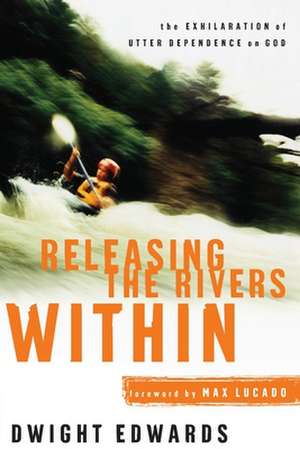
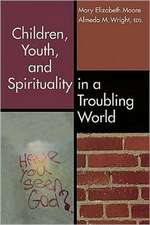
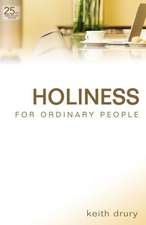
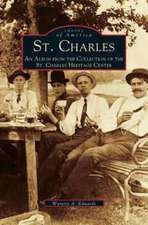
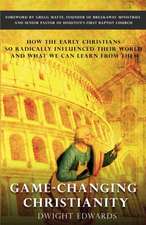
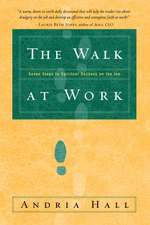
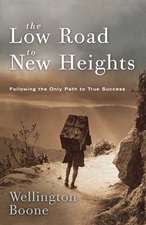
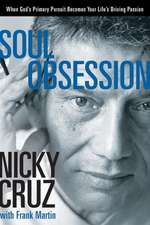
![The Liturgy of the Word with Children: A Complete Three-Year Program Following the Lectionary [With CDROM]](https://i0.books-express.ro/bt/9781585957002/the-liturgy-of-the-word-with-children.jpg)

